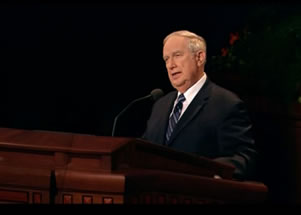The Book of Mormon
clearly teaches that rape deprives women of their chastity
and virtue:
 Moroni
9:9 "... For behold, many of the daughters of the Lamanites
have they taken prisoners; and after depriving them of
that which was most dear and precious above all things,
which is chastity and virtue--" Moroni
9:9 "... For behold, many of the daughters of the Lamanites
have they taken prisoners; and after depriving them of
that which was most dear and precious above all things,
which is chastity and virtue--"
If the
Book of Mormon is true, then victims of sexual abuse have
reason to believe they have lost their chastity and virtue.
It is
easy to understand how the stressing of the importance of
being "pure and chaste" is warped into the importance of
"virginity". Virginity has long been considered the token
of purity and virtue. To loose the one, acording to Mormon
teaching, is to loose the other. Young girls and boys are
taught from early on in the Church that only a girl who
is a virgin is good enough to marry in the temple.
Unfortunately, many self-righteous and insensitive men in
the Church have absolutely no clue as to how such a mis-teaching
of a valuable principle (sexual restraint/abstinence) would
affect impressionable young minds. Young girls and adolescents
who have been sexually assaulted, either as children or
teenagers consider the loss of their virginity or sexual
innocence to be the loss of their chastity and virtue. Through
molestation and rape, they have instantly and irrevocably
become "tainted and used goods" in their own eyes and the
eyes of their peers through no fault of their own. And to
heap great insult and injury, it was (and continues to be)
the instruction of the Bishop to help the person who has
"lost their chastity" to identify their part in the
transgression and what they need to repent of. (Perhaps
they wore suggestive clothing, or behaved in a sexually
provocative way, for example; and thereby must assume a
measure of blame for the crime which was perpetrated on
them.)
 "The
victim must do all in his or her power to stop the abuse.
Most often, the victim is innocent because of being disabled
by fear or the power or authority of the offender. At some
point in time, however, the Lord may prompt a victim
to recognize a degree of responsibility for abuse. Your
priesthood leader will help assess your responsibility so
that, if needed, it can be addressed. Otherwise the seeds
of guilt will remain and sprout into bitter fruit. Yet no
matter what degree of responsibility, from absolutely none
to increasing consent, the healing power of the atonement
of Jesus Christ can provide a complete cure." "The
victim must do all in his or her power to stop the abuse.
Most often, the victim is innocent because of being disabled
by fear or the power or authority of the offender. At some
point in time, however, the Lord may prompt a victim
to recognize a degree of responsibility for abuse. Your
priesthood leader will help assess your responsibility so
that, if needed, it can be addressed. Otherwise the seeds
of guilt will remain and sprout into bitter fruit. Yet no
matter what degree of responsibility, from absolutely none
to increasing consent, the healing power of the atonement
of Jesus Christ can provide a complete cure."
- Apostle Richard G. Scott "Healing the Tragic Scars
of Abuse," General Conference, Ensign, May 1992
“Victims
of rape or sexual abuse frequently experience serious trauma
and unnecessary feelings of guilt. Church officers should
handle such cases with sensitivity and concern, reassuring
such victims that they, as victims of the evil acts of others,
are not guilty of sin, helping them to overcome feelings
of guilt and to regain their self-esteem and their confidence
in personal relationships."
“Of course, a mature person who willingly consents to
sexual relations must share responsibility for the act,
even though the other participant was the aggressor.
Persons who consciously invite sexual advances also have
a share of responsibility for the behavior that follows.
But persons who are truly forced into sexual relations are
victims and are not guilty of any sexual sin."
- First Presidency Letter to General Authorities, Regional
Representatives, and other priesthood leadership, 7 Feb.
1985
The Prophet David O. McKay is quoted in President Kimball's
book as follows:
" . . . Your virtue is worth more than your life. Please
young folk, preserve your virtue even if you lose your lives.
Do not tamper with sin . . . do not permit yourselves to
be led into temptation. Conduct yourselves seemly and with
due regard, particularly you youg boys, to the sanctity
of womanhood. Do not pollute it."
The Prophet Heber J. Grant is also quoted in President Kimball's
book:
"...There is no true Latter-day Saint who would not rather
bury a son or daughter than to have him or her lose his
or her chastity -- realizing that chastity is of more
value than anything else in all the world."
Later in the book, Kimball again addresses the matter of
Chastity with the elsewhere mentioned paragraph:
"Also far-reaching is the effect of loss of chastity. Once
given or taken or stolen it can never be regained. Even
in forced contact such as rape or incest, the injured one
is greatly outraged. If she has not cooperated and contributed
to the foul deed, she is of course in a more favorable position.
There is no condemnation where there is absolutely no voluntary
participation. It is better to die in defending one's
virtue than to live having lost it without a struggle."
Considering these quotes, it is clear that virtue is equated
with chastity. One cannot struggle against another and lose
their virtue if virtue means "their intent to be good/righteous".
No, the message which is clearly being portrayed is that
of chastity and virtue being synonymous.
Now, imagine the terrible shame and overpowering guilt a
child or young teenager might feel for her "cooperating"
with her abuser to protect a younger sibling, or prevent
harm from coming to a family member? Imagine the survivor's
guilt knowing that the teaching of the Prophets of God is
their life is not as important as their virginity/chastity/virtue,
that their parents would rather they be dead than live with
the shame that their child is no longer a virgin, no longer
chaste, no longer virtuous.
"If he burglarized, he should return to the rightful owner
that which was stolen. Perhaps one reason murder is unforgivable
is that having taken a life, the murderer cannot restore
it. Restitution in full is not possible. Also, having
robbed one of virtue, it is impossible to give it back."
- President Spencer W. Kimball, General Conference, Ensign,
November 1980
Believing this Mormon teaching can have negative effects
on both individuals and communities. The October 17th, 2003,
Deseret Morning News headline reads "90% of Provo rapes
not reported to police." In the report, a BYU police officer
explains that religious beliefs are the reason:
From the article:
"[BYU Police Officer Arnie] Lemmon said most Provo residents
are religious and have a tendency to stigmatize discussion
of sexual assault and sometimes to demonize the survivor."
"[The Mormon rape victim] said something that blew me
away. She said, 'I should have died before I let him do
that to me,' " Lemmon said. "I was troubled that she
had to believe that."
"Lemmon read from a letter written by a BYU rape victim
who shared a similar belief. "I'm a perversion to the
good saints of my church," wrote the victim, who said she
wished she were dead. Tragic thoughts like these are common
among rape victims in Provo, Lemmon said."
- Deseret Morning News, Friday, October 17, 2003, "90%
of Provo rapes not reported to police," http://deseretnews.com/dn/view/0,1249,515039389,00.html
So it's fair to say that Mormonism gives victims reasons
to hate and blame themselves for their abuse. The popular
book Mormon Doctrine declares, "Better dead
clean, than alive unclean. Many is the faithful Latter-day
Saint parent who has sent a son or daughter on a mission
or otherwise out into the world with the direction, 'I
would rather have you come back home in a pine box with
your virtue than return alive without it' "
- Mormon Doctrine, Second Edition, Page 124
Anyone
who knows someone who has been raped or sexually molested
knows that most victims feel "dirty", and intense shame
and guilt. And we are taught that such feelings of shame
and guilt or feeling "unclean" are promptings or messages
from the Holy Ghost that we have done something wrong. This
only further reinforces the unhealthy teaching that virginity
and sexual innocence are the same as chastity and virtue;
and that loosing them is worse than death... that it would
have been better for you to have died, than to live having
lost these things.
"If we do whatever is necessary to become morally clean
before the Lord, we will be able to “stand with confidence—unafraid
and unashamed and unembarrassed—in the presence of God.
This is the promise held out to every virtuous man and woman”
- Apostle Gordon B. Hinckley, in Conference Report, Oct.
1970, page 66 and Improvement Era, Dec. 1970, page 73
So if
someone doesn't feel unashamed and unembarrased, then are
they virtuous?
"From the beginning of time, the Lord has set a clear and
unmistakable standard of sexual purity. It always has been,
it is now, and it always will be the same. That standard
is the law of chastity. It is the same for all—for men and
women, for old and young, for rich and poor. In the Book
of Mormon, the prophet Jacob tells us that the Lord delights
in the chastity of His children (see Jacob 2:28). Do
you hear that, my brothers and sisters? The Lord is not
just pleased when we are chaste; He delights in chastity.
Mormon taught the same thing to his son Moroni when he wrote
that chastity and virtue are “most dear and precious
above all things” (Moroni 9:9)."
- President Ezra Taft Benson, BYU Devotional, October
13, 1987, New Era, Jan. 1988, page 4
Are these deep religious beliefs healthy or harmful to people?
"Of all crimes, sexual abuse of children is one of the most
devastating to the victim—whether or not there were multiple
occurrences, and regardless of the extent of the abuse.
... Those who are victims of such abuse often grow up with
deep, unresolved feelings of guilt, unworthiness, anger,
and betrayal. ... Desperately afraid and unhappy, they may
fear that by reporting the abuse they will be tearing the
family apart.. “All I could do,” says one victim, “was hope
something would happen to make everything ‘all better.’”
- Maxine Murdock, “Hope and Healing,” Ensign, Jan. 1993,
page 62
For
more analysis of Mormon sexuality read:
Sexuality
Within The Contemporary Mormon Experience by William
M. Gardiner
|